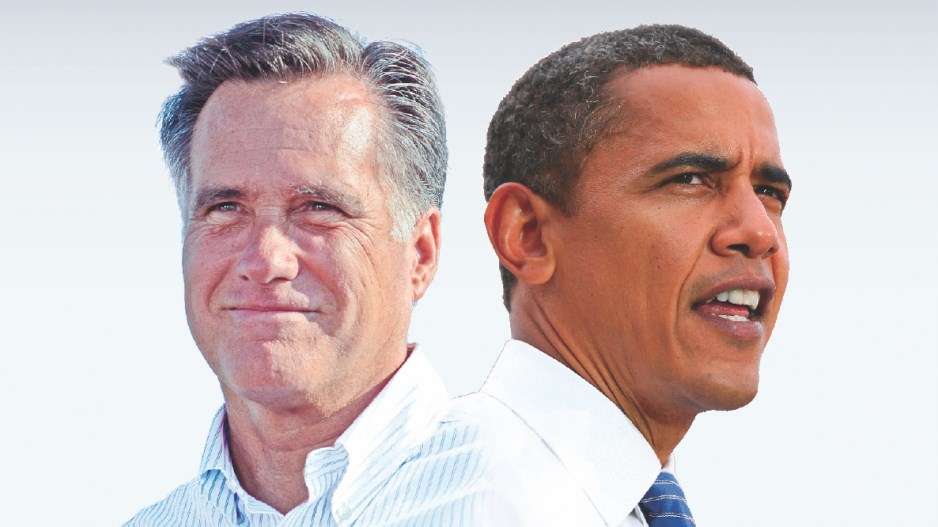If Americans elect Mitt Romney as the 45th president of the United States, the political pendulum's conservative swing would lay the groundwork for more competitive uncertainty for Canadian businesses.
Jock Finlayson, executive vice-president of the Business Council of BC, warned that Canadian companies face erosion of their competitive edge with their counterparts in the U.S. if Romney enacts tax reform and cuts U.S. corporate taxes as proposed in his election platform.
The current U.S. corporate tax rate is at roughly 35%, and during the campaign, Romney has said he would cut it to 25%, which is comparable to Canada's combined federal-provincial corporate tax rate.
Romney had also said he would strengthen the country's research and development tax credit, which would contrast with Ottawa's move in the March 2012 budget to reduce the SR&ED tax credit for non-Canadian firms operating in the country.
Frank McKenna, former Canadian ambassador to the U.S. and now deputy-chairman of TD Bank Group, said Romney will essentially need to walk the talk in his plans to boost the economy.
"He needs to have credible fiscal plans and credible economic plans. That's the most important thing to the Canadian relationship: to have a trading partner south of the border that is on a sound financial footing. If it's not credible, debt rating agencies will downgrade the U.S. and the economy could go into a tailspin."
Chris Sands, senior fellow at the Hudson Institute and research advisory board member of the Macdonald-Laurier Institute, told BIV, "There's going to be a quick book on Romney, whether he is able to actually work with Congress. He was able to work with the Massachusetts legislature, which was majority Democrat … but whether Congress will have the same willingness to work with him, I think, is an open question, and he may struggle with it. The challenge will be if Romney has come in with the right kind of mandate to get Congressmen to follow him."
Rob Edel, chief investment officer at Vancouver's Nicola Wealth Management, said Romney's electoral win could lead to a significant shift in U.S. monetary policy. Since the global financial crisis, U.S. Federal Reserve Chairman Ben Bernanke has injected more than a trillion dollars into the U.S. economy and dropped interest rates to record lows to bolster key sectors like housing and provide a boost to job creation.
"Romney has said he would not reappoint Ben Bernanke as chairman of the Fed. Bernanke may not want to run, anyway, but the thinking is, Romney would put in a more monetary hawk, someone who is a bit more restrictive in terms of monetary policy, which means less quantitative easing," said Edel. "Romney has indicated he is for a strong U.S. dollar."
While such a move would help exporters by pushing down the loonie versus the greenback, it could hurt Canadian gold producers, with the price of gold edging lower versus the U.S. dollar – which in turn could potentially damage gold company stocks on the TSX.
On the flip side, pension funds, regardless of where they are in the States or Canada – including the CPP – could potentially benefit from higher returns from government bonds. This would be the result of a potential increase in U.S. government bond rates following the departure of Bernanke, who is currently keeping rates low.
But the biggest issue worrying economists and Canadian interests is the pending "fiscal cliff" the U.S. federal government faces in less than six weeks.
Greg Noble, a Vancouver tax partner at Ernst and Young, noted that balancing the budget may involve more cuts to government programs, which could have economic consequences down the road.
"For the Romney camp, they cannot increase taxes. They've made an ally with the Tea Party faction and their fundamental plank in their platform is you cannot increase taxes. It means some tough decisions."
John Manley, president and CEO of the Canadian Council of Chief Executives and former deputy prime minister, told BIV that Prime Minister Stephen Harper will need to move quickly to avoid potential issues with the Romney administration.
"When the U.S. economy is weak, there is a tendency to become more protectionist. We've seen some of the effects of that in some of the irritating things that have happened, but the challenge for Canada is to stay on the agenda," said Manley. "It entails the personal involvement of the Prime Minister of Canada and his ministers, because at the end of the day, they can actually get things done." •




